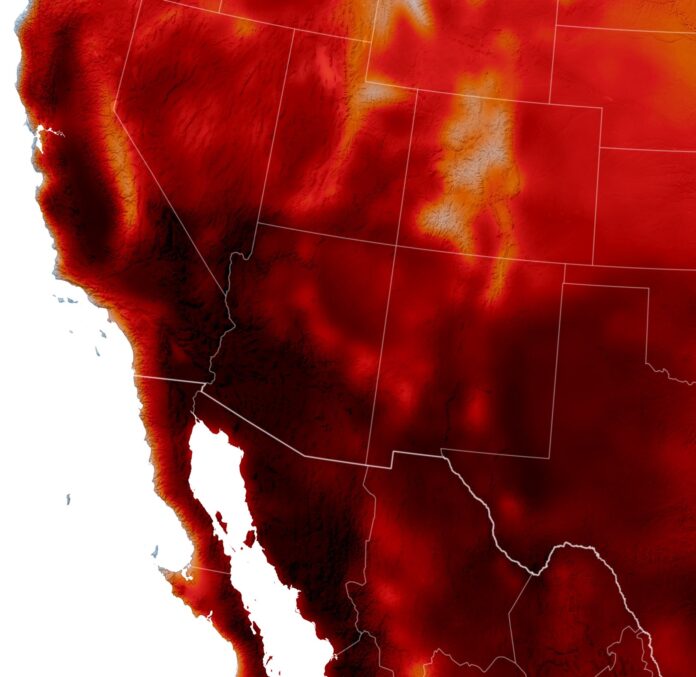
As the American Southwest endures a record-setting heat dome, I reviewed the latest influences humanity is having on the global climate. Two stories appeared in the last few days that tell us about the challenges we face and our limited success in reducing the risks.
United Nations Chief Predicts ‘Highway to Climate Hell’
In a recent speech, UN Secretary-General António Guterres warned that the planet is on a hot streak and that we need “an exit ramp off the highway to climate hell.” He noted that the nations of the world are playing Russian Roulette with the planet and that the decisions we collectively make in the next 18 months will be critical stating “It’s climate crunch time.”
The rate of warming has sped up based on results from recent studies that calculate fossil-fuel-driven warming is increasing atmospheric mean temperatures by 0.26 Celsius (0.468 Fahrenheit) degrees per decade not including the effect of the latest effect of the cyclic El Niño arising in the mid-Pacific Ocean.
A World Meteorological Organization report states there is an 80% probability that in one of the next five years, we will see mean global temperatures exceed the 1.5 Celsius (2.7 Fahrenheit) lower threshold target established in Paris at COP21 back in 2015.
The mean temperature rise in Canada has already surpassed the 1.5 Celsius threshold. In the last 12 months, Canada is 1.63 Celsius (2.93 Fahrenheit) higher than it was in the mid-19th century.
Guterres noted in his speech that action is needed by the richest 1% whose emissions equal the lowest 66% on the planet. He stated, “It is a travesty of climate justice that those least responsible for the crisis are hardest hit: the poorest people, the most vulnerable countries, Indigenous peoples, women and girls.”
Have Global Carbon Dioxide Emissions Peaked?
According to a Bloomberg research study confirming results from a Climate Analytics report, 2024 may be the turning point in our struggle to reduce global carbon dioxide (CO2) emissions.
The International Energy Agency (IEA) reports that rapid growth in renewable energy has upped power generation capacity by nearly 50% approaching 510 Gigawatts. This is the fastest growth rate in the last 20 years.
Based on existing policies and forecasts the IEA projects renewable capacity to reach 7,300 Gigawatts by 2028. It’s encouraging news but if projected to 2030 will still fall short of the 11,000 Gigawatts forecasters state we need to reverse CO2 emissions significantly.
Renewables need to triple to meet Paris climate goals and emission reduction targets. Instead, we will only grow 250%. We can make up the difference over the next six years if we can increase capacity by 21% annually. Bloomberg’s report states we can keep temperatures from rising beyond 1.75 Celsius (3.15 Fahrenheit) in the next two decades by spending an additional $215 trillion on new renewable projects. Based on our pace, however, we see CO2 emissions drop by 27% by 2050, and a rise in global temperatures of 2.6 Celsius (4.68 Fahrenheit) as a consequence by 2100. This would be an unacceptable outcome with dire consequences for countries nearest to the equator making many areas unliveable.
If you want to know why cannot get to net zero by 2050, look no further than to the governments of several countries and the fossil fuel industry they support. Oil companies are doubling down on exploration and pumping out more products, they say, to meet growing world energy demand.
The industry is on a consolidation and growth path. Exxon has just acquired Pioneer Natural Resources. Chevron is acquiring Hess. ConocoPhillips is buying Marathon. These companies are spending hundreds of billions of dollars betting on the gamble that nothing will replace petrochemicals in the short to mid-term.
China isn’t about to abandon coal. The United States has become the largest exporter of fossil fuels to the world. These two countries and fossil fuel companies that operate within their boundaries and elsewhere hold the rest of the world hostage to their national and corporate objectives. The fossil fuel industry intends to exact its pound of flesh until it has pumped out and sold every last barrel and mined and delivered every last ton of coal.
Meanwhile, the Fossil Fuel Non-Proliferation Treaty (FFNPT) which represents an alliance of environmental groups, scientists, and the public tries to muster international collaboration to end global dependence on fossil fuels. Against the ambivalence of China, the United States, and other countries equally committed to their fossil fuel industries, it will take years before the FFNPT is ratified by the UN.








